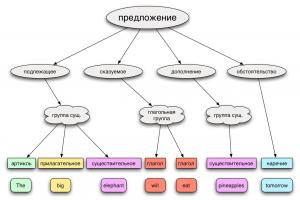Presentation for parents
“Home game library for speech development”

Games to enrich a child's vocabulary
"Say the word"
You start a phrase and the child finishes it. For example: a crow croaks, and a sparrow...(chirps). The owl flies, and the hare...(runs, jumps). The cow has a calf, and the horse has ... (foal), etc.

“Let’s look for words in the kitchen”
In the kitchen you can play games to enrich your child’s vocabulary.
What words can be taken out of borscht?
Vinaigrette? Kitchen cabinet? Plates? etc.

"I'm treating you"
Let's remember the words and treat each other. The child names a “delicious” word and puts it on your palm, then you give it to him, and so on until you have “eaten” everything. You can play with “sweet”, “sour”, “salty”, “bitter” words.

"I noticed"
Let's check which of us is the most attentive. We will name the objects we pass by, and we will also be sure to indicate what they are. Here's the mailbox - it's blue. I noticed a cat - it was fluffy. The child and the adult can name the objects they see in turns.

"Let's make juice"
From apples...(apple); from pears...(pear); from carrots, plums, cherries, oranges, lemons, etc.
Did you manage? And now it’s the other way around: what is orange juice made from? Etc.

"Magic glasses"
“Imagine that we have magic glasses. When you put them on, everything turns red (blue, green, transparent, etc.). Look around, what color has everything become? Tell me?” (red table, etc.)

Games for the development of sound culture of speech.
"Frog"
Isolating a sound from a series of vowels:
a, and, y, yu, i, e. “You’ll jump like a frog if you hear “a”; you’ll lower your hands to other sounds.” By analogy, the game is played on other vowel sounds. Later, you can play with consonant sounds.

"Ball Game"
“I will name objects and throw you a ball. You will catch only when you hear the sound “w” in a word (name any sound). If there is no sound in the word, then there is no need to catch the ball. Begin.."

Games to develop fine motor skills.
"I'm helping my mother"
You spend most of your time in the kitchen. You are busy preparing dinner. The baby is spinning around you. Invite him to sort out peas, rice, buckwheat. Thus, he will give you all he can
help and train your
fingers.

"Magic Wands"
Give your child counting sticks. Let him lay out the simplest geometric shapes, patterns, letters, objects from them. You can add details cut out of paper.
MBDOU compensating orientation No. 16
"Golden Key"
Innovative forms of work
with parents
on speech development
Educator
gr. SSD No. 3 “Bell”
Maysyuk A. M.


In any form of work with parents you can find
and select that one
"Highlight" »
On which to build training for parents in practical work techniques.

Principles of working with parents:
- purposefulness;
- systematic;
- benevolence, openness; planning;
-differentiated approach to working with parents
taking into account the specifics of each family.
Family study methods:
survey; monitoring the child;
conversation with a child; conversation with parents.
The main means of speech development are:
-fairy tales;
- didactic games;
- theatrical games.
-literary evenings;
-folklore holidays;
trade fairs;
KVN and etc.

Collaboration between parents and teachers is becoming increasingly popular; educators are looking for new points of interaction.
INNOVATIVE
forms of working with parents,
that would provide solutions to the problem of each child and family individually.

- Innovation(innovation) - create something new.


LOGO TRAININGS -
This is a series of speech therapy sessions
(parents working with a child
at home).
- DIARIES
They will inform parents about the child's progress. You can work with ready-made speech material .
INFORMATION STAND
"RECHEVICHOK"

LEISURE DIRECTION IN WORK
It may be the most attractive
popular and useful
BUT it is also the most difficult thing in organizing, since
allows parents to see problems from the inside
your child.
SPEECH HOLIDAYS
They are useful for developing communication skills
skills and
skills.
Increased self-esteem, awareness
the need for correct speech,
consolidation of the material covered. It’s not for nothing that the proverb says:
“A child grows not from bread, but from joy.”
LIBRARY OF GAMES AND EXERCISES
Parents can take home the necessary benefits
on speech development to use them
for individual lessons at home..

OPEN CLASSES -
Parents can not only see the achievements of their own children, but can also see the work of a teacher and speech therapist, and gain theoretical and practical knowledge in the field of work.
OPEN DAYS -
It can be held 2-3 times a year to familiarize parents with the organization of educational work with children, successes and problems.

PARENT CONFERENCES
To exchange experiences in family education, where a specialist can speak on a current topic:
“The role of families in raising a child with speech impairment.”
For the conference
you can prepare an exhibition of children's works and pedagogical literature; materials reflecting work

PARENT MEETINGS
(change the model of parental
meetings taking into account modern requirements).
Can be carried out in a non-traditional form,
organize the practical part in the form of a game,
practical exercises, discussions,
small master classes.
CONSULTATIONS
On the organization of the work of the speech center - based on the results of diagnostics, on the requests of parents - based on the results of correctional education
methods and techniques for producing sounds in children.
SEMINARS
This is a series of meetings on a specific topic to improve parental competence, i.e., the implementation of theoretical models in the process of raising and educating children with speech impairments.

Information form for working with parents.
Introduce parents to booklets, reminders, through parent corners.
Questionnaire

JOINT PROJECT ACTIVITY
Participants will be educators, parents and children. A project with the aim of forming an active position of parents in matters of children's speech development. Introducing parents to various forms of work to enhance the speech development of children.
INFORMATION BOOKS
“Play and know the deal”
which will help include materials for practical use in games and speech development activities with children at home.
CLASSES TRAININGS
In order to prevent speech disorders in children of all age groups.
VIDEO LIBRARY
Parents can take a cassette with classes, consultations, workshops on a topic of interest in order to accurately complete the tasks of a teacher, speech therapist, or speech pathologist at home.

inclusion of parents in the pedagogical process is the most important condition for the full speech development of a child Don't skimp on praise Be sure to thank your parents for their attentive attitude.

Slide 1
Slide description:
Slide 2
Slide description:
Slide 3
Slide description:
Slide 4
Slide description:
Slide 5
Slide description:
Slide 6
Slide description:
Slide 7
Slide description:
Slide 8
Slide description:
Slide 9
Slide description:
Slide 10
Slide description:
Slide 11
Slide description:
Slide 12
Slide description:
Slide 13
Slide description:
Slide 14
Slide description:
Slide 15
Slide description:
Slide 16
Slide description:
Best friend. If you're waiting in a room filled with magazines, you can play "best friend stories." Let the child choose the picture he likes. It could be a person - big or small - or an animal. Ask him to talk about his “best friend.” Where does he live? What games does he like to play? Is he calm or does he like to run? What else can you tell about him?
Slide 17
Slide description:
Stories based on pictures It’s good if you can pick up several pictures related to a common plot. For example, from a children's magazine (like "Funny Pictures"). First, mix these pictures and invite your child to restore order so that they can make up a story. If your child has a hard time at first, ask a few questions. If you don’t have such a set of plot pictures at hand, just take a postcard. Ask your child what it depicts, what is happening now, what could have happened before, and what will happen later.
Slide 18
Slide description:
Slide 19
Slide description:
Stories from life Children enjoy listening to stories about what happened when they were very small or when they were not in the world at all. You can tell these stories in the evening before going to bed, or you can tell them in the kitchen, when your hands are busy and your thoughts are free. What to talk about? For example, how the baby kicked his legs in your stomach when he was not yet born. Or how you learned to ride a bike. Or how dad flew an airplane for the first time... Some stories you will have to tell more than once. Ask other family members to join the game.
Slide 21
Slide description:
How did it end? One way to develop coherent speech can be watching cartoons. Start watching an interesting cartoon with your child, and at the most exciting point, “remember” about the urgent matter that you must do right now, but ask the child to tell you later what will happen next in the cartoon and how it will end. Don't forget to thank your narrator!
Slide 22
Slide description:
You see, it is not at all necessary to drop everything and arrange special “sessions” of communication. After all, you can talk about something important at lunch, on the way to kindergarten, on a walk, and before bed. This does not require much time, but you need attention to the little person, respect for his interests, and understanding of his experiences. Many of our accusations and demands arise as a result of the fact that we, parents, have a poor understanding of the psychology of the child and think that a preschooler should have the same views on life, the same opportunities and needs as adults. But this is far from true. By developing communication, an adult not only teaches a child new types of interaction with other people, not only facilitates his contacts with others, but also contributes to the formation of his spiritual life, opens up new facets of the external and internal world, and shapes his personality.
Slide 1
The role of the family in the development of a child’s speech
Completed by: teacher 1 ml. group of Golubkova N.V.
Presentation-consultation for parents
Slide 2

From two to six years old, a child reminds us of a casket that is not easy to open. There are so many hidden possibilities in it that we can’t count them. And it depends on us, adults, how these capabilities and abilities of the child will develop.
Slide 3

Many parents believe that if a child attends a kindergarten, then the development and learning should be fully provided by the kindergarten staff. Experience shows that no preschool institution can completely replace family education. Educators know very well which families work with children and which do not. Specially organized classes give children a lot: knowledge, skills, abilities. But if they are not interested in the child’s activities at home and do not encourage diligence and diligence, the child also begins to treat them with disdain and does not strive to work better or correct mistakes. Some children are offended by such inattention from their parents, they become withdrawn and stop being sincere and frank. On the contrary, parents’ interest in the affairs of a preschooler gives special significance to all the child’s achievements.
Slide 4

A child masters speech more successfully when he is taught not only in a preschool institution, but also in the family.
RECOMMENDATIONS
Pronunciation deficiencies can be the result of disturbances in the structure of the articulatory apparatus: deviations in the development of teeth, incorrect positioning of the upper teeth in relation to the lower ones, etc. To prevent speech defects, it is very important to monitor the condition and development of the dental system, seek advice from a dentist in a timely manner, and eliminate defects, treat teeth. Particular attention should be paid to hearing. Hearing plays an important role in a child’s mastery of speech and in the correct and timely assimilation of sounds. Hearing speech, individual words, sounds, the child begins to pronounce them himself. Even with a slight hearing loss, he is deprived of the ability to perceive speech normally. Therefore, it is very important for parents to pay attention to the development of their child’s hearing. It is necessary to protect the child’s hearing from constant strong sound influences (radio and TV turned on at full volume), and in case of diseases of the hearing organs, treat them in a timely manner, and not with home remedies, but in medical institutions.
Slide 5

Parents should take care of the child’s still fragile vocal apparatus, avoid excessively loud speech, especially in cold weather, teach breathing through the nose, and prevent chronic runny nose. Adults should help the child master correct sound pronunciation, but should not force speech development. It is harmful to overload a child with complex speech material, force him to repeat words he does not understand, memorize poems that are complex in form, content and volume, teach him to correctly pronounce sounds that, due to the unpreparedness of the articulatory apparatus, are not yet available to him (for example, at 2-3 years old, teach him to correctly pronounce hissing , sound p), read works of fiction intended for school-age children. A child masters speech by imitation. Therefore, it is very important that adults monitor their pronunciation, speak slowly, and pronounce all sounds and words clearly. Often the reason for incorrect pronunciation of sounds is the child’s imitation of the defective speech of adults, older brothers, sisters, and friends with whom the baby often communicates.
Slide 6

Parents should also pay attention to the fact that when communicating with a child, especially in early and early preschool age, one should not “imitate” the child’s speech, pronounce words distorted, or use truncated words or onomatopoeias instead of generally accepted words (“Bibika”, “Lala” etc.), lisp. This will only slow down the assimilation of sounds and delay the timely mastery of the dictionary. The frequent use of words with diminutive or affectionate suffixes, as well as words that are inaccessible to his understanding or complex in terms of sound and syllables, does not contribute to the development of a child’s speech. If your child pronounces any sounds, words, or phrases incorrectly, you should not imitate him, laugh, or, conversely, praise him. It is also impossible to demand the correct pronunciation of sounds during that period of the baby’s life when this process is not completed.
Slide 7

Some deficiencies in children’s speech can only be eliminated with the help of specialists, speech therapists. But a number of shortcomings can be easily eliminated, and this is accessible not only to the teacher, but also to parents. The family usually corrects the child when he pronounces this or that sound or word incorrectly, but this is not always done correctly. Correcting speech errors must be approached very carefully. You cannot scold a child for his bad speech and demand that he immediately and correctly repeat a word that is difficult for him. Often this leads to the child refusing to speak at all and withdrawing into himself. Mistakes must be corrected tactfully and in a friendly tone. You should not repeat a word your child pronounces incorrectly. It's better to give a sample of his pronunciation.
Slide 8

While studying with a child at home, reading a book to him, looking at illustrations, parents often invite him to answer questions about the content of the text, convey the content of a fairy tale (story), and answer what is shown in the picture. Children cope with these tasks, but make speech errors. In this case, you should not interrupt the child, you must provide the opportunity to finish the statement, and then point out errors and give an example. Very often children ask us different questions. Sometimes it is difficult to find the correct answer to them. But you cannot avoid the child’s questions. In this case, you can promise to give an answer when the child has eaten (taken a walk, completed some task, etc.), while the adult has time to prepare for the story. Then the child will receive the correct information, see an interesting interlocutor in the adult, and in the future will strive to communicate with him.
Slide 9

At the same time, we must not forget the elementary principles of teaching: - The teacher can teach the student if he himself knows the material. You must be a role model. - You cannot force a child to study. Classes will give the best results when combining different teaching methods. - A child should learn by playing.
Olga Belova
Presentation “Features of speech development of children 4–5 years old”
Slide 1
Features of speech development of children 4-5 years old
Slide 2
A child of the fifth year of life shows significant progress in mental and speech development. The baby begins to identify and name the most significant connections and accurately reflect them in speech. His speech becomes more varied, more precise and richer in content. The stability of attention to the speech of others increases, he is able to listen to the answers of adults to the end.
Slide 3
Sound pronunciation improves significantly: softened pronunciation of consonants completely disappears, omission of sounds and syllables is rarely observed. By the age of 4, almost all children pronounce hissing sounds, and by the age of 5, the sounds L and R appear. So, at the age of 5, the pronunciation of all sounds should be normal. But some children still have unstable pronunciation of some sounds.
Slide 4
In the fifth year of life, a child is able to recognize by ear the presence of a particular sound in a word, and select a word for a given sound.
Slide 5
If at 4 years old the child’s vocabulary was 2500 words, then at 5 years old it was already 3000 words. This allows the child to construct his or her statements more fully. In the speech of children, adjectives more often appear, which they use to denote the characteristics and qualities of objects, to determine color; in addition to the main ones, additional adjectives are called (blue, dark, orange; possessive adjectives begin to appear - fox tail, hare hut, words indicating the properties of objects, qualities, the material from which they are made (iron key).Increasingly uses adverbs, pronouns, complex prepositions (from under, about, etc., generalizing words appear (dishes, clothes, furniture, vegetables, fruits).
Slide 6
The child constructs his statement from 2-3 simple common sentences; he uses complex and complex sentences more often, but still not enough.
Slide 7
The growth of vocabulary and the use of complex sentences leads to the fact that children more often make grammatical errors: “want” instead of want, “red” ball.
Slide 8
Some children at this age can retell the text of a fairy tale or story they have read. However, many still cannot independently, without the help of adults, retell the text coherently, consistently and accurately.
Slide 9
Sufficient speech hearing allows a child to distinguish between increases and decreases in voice volume and intonation in adult speech. Children can reproduce various intonations themselves, imitating the heroes of a fairy tale.
Slide 10
The older a child gets, the more influence the family has on his speech development. Family members need to watch their speech: do not speak quickly, pronounce words correctly, and the intonation should be calm. At the age of 3-5 years, stuttering sometimes occurs, more often in boys, who are very active and emotional. The reasons for it are different: fear, imitation, hereditary factor, etc. Therefore, be attentive to the child’s speech; if you notice “stammers,” you should immediately contact a speech therapist.
Slide 11
Slide 12
Thank you for your attention!
Slide 13
Sources for pictures and presentation template
Publications on the topic:
Presentation “Integrated approach to the organization and content of speech development of children of primary preschool age” Timely mastery of correct, clear speech is important for the formation of a full-fledged personality. A person with a well developed
Consultations for parents of children with disabilities “Features of speech development of a preschool child” Consultations for parents of children with disabilities: “Features of speech development of a preschool child” Speech development disorders – one.
Consultation for parents “Features of speech development of children 2–3 years old” When raising a 2-3 year old child, you need to pay close attention to strengthening his health, instilling cultural and hygienic skills, and development.
Consultation for parents “Features of speech development of young children”“Features of speech development in young children.” After two years, even the most silent children begin to speak. Although this is happening.
Features of mental and speech development of hearing-impaired children The development of the psyche of a hearing-impaired child proceeds with deviations from the usual norm. The point is not only that the child has poor hearing, i.e.
Presentation “Features of development of children 4–5 years old” 1. Height became 102 cm or more and increased by 4-5 cm; weight became 16 kg or more and increased by 1-2 kg. 2. The child’s body has actively changed its proportions.
Features of speech development in preschool-age children with general speech underdevelopment The lack of development of the communicative function of speech is one of the reasons for the unpreparedness of children with speech pathology for school education. In preschool.








